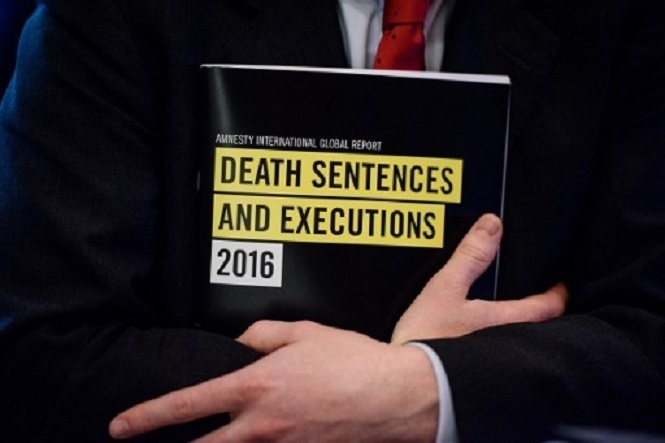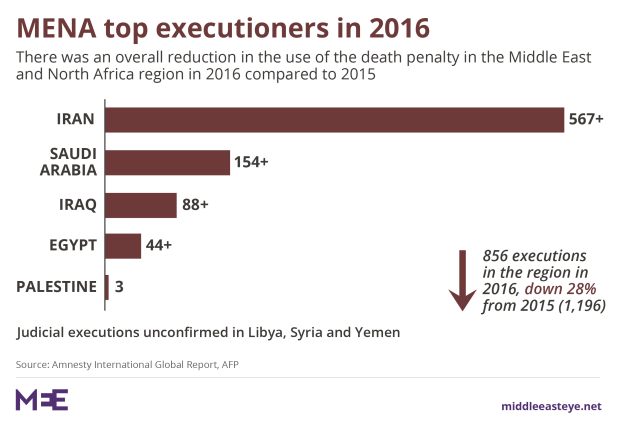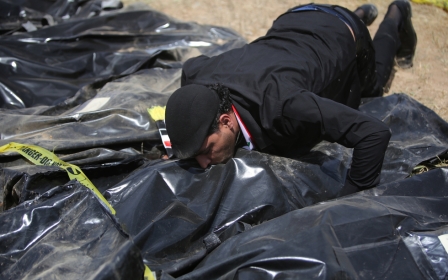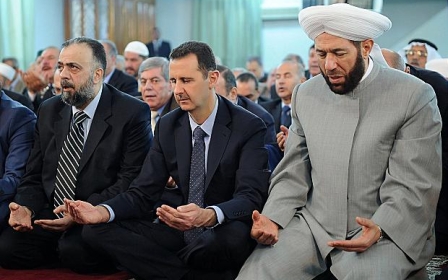Middle East home to three of top five global executors: Amnesty

The Middle East accounts for three of the top five executors in the world, a new report from Amnesty revealed on Tuesday.
While China again led the global ranking, Iran, Saudi Arabia and Iraq followed, in that order.
And excluding China, 87 percent of all executions took place in these three countries, plus Pakistan.
The number of executions recorded in the Middle East and North Africa decreased by 28 percent against the previous year, from 1,196 executions in 2015 to 856 in 2016.However, the report states, it was not possible to confirm if judicial executions took place in Libya, Syria or Yemen, which are all currently at war.
Amnesty reported in February that the Syrian government has secretly killed between 5,000 and 13,000 political prisoners in extra-judicial killings between 2011 and 2015.
In Iran, which accounted for 66 percent of all recorded executions in the region, the use of the death penalty was down 42 percent on 2015, from at least 977 to at least 567 in 2016.
However, reports indicated that at least two people who were under 18 at the time of the crime for which they were sentenced to death were executed in Iran last year.
Some 33 executions were carried out in public, the report says, and the majority – around 328 – were carried out for drug-related offences.
In August, 25 Sunni men were executed after being convicted of what Amnesty calls the “vaguely worded crime, under Iranian law, of "enmity against God" (moharebeh), in connection with a number of armed activities, which occurred mainly in Kurdistan Province between 2009 and 2011.
The defendants’ right to a fair trial, it adds, was “blatantly violated”.
In 2016, Saudi Arabia executed at least 154 people, near to its high of 158 in 2015, the highest number recorded for Saudi Arabia since 1995.
Amnesty broke down the convictions behind the death sentence in Saudi Arabia: 81 for murder, 47 for “terrorism”, 24 for drug-related offences, one for kidnapping and torture, and one for rape.
The trial which led to the execution in January of Sheikh Nimr Baqir al-Nimr, who had been an outspoken critic of discrimination against the country’s Shia minority, “contravened international fair trial standards”, the report states. He was convicted of “terrorism”.
“The authorities did not inform his family before he was executed,” the report states. “They refused to return his body for burial, despite the family’s numerous requests, thereby compounding their suffering.”
In Iraq, at least 88 people were executed last year, with 145 new death sentences handed down, including for 40 people who were convicted over the Speicher massacre, in which hundreds of Iraqi military recruits were killed.
At least 44 people were executed in Egypt in 2016, the report says, having received sentences in relation to “terrorism” and political violence.
A further 237 people received death sentences in Egypt in 2016, including 15 men who were sentenced to death by military courts after what Amnesty terms “grossly unfair trials and in connection to offences related to political violence and 'terrorism' that did not lead to loss of life, in contravention of international human rights law”.
On 15 January 2017, after the period which the report covers, Bahrain executed three people, its first use of the death penalty since 2010.
And similarly in Kuwait on 25 January 2017, seven were killed in the first executions there since 2013.
The United Arab Emirates did not carry out any executions in 2016, but 26 death sentences were handed down, with three commutations granted.
The scope of the death penalty in the UAE was widened in 2016, the report states, and a new law now relates to data protection and expression.
New MEE newsletter: Jerusalem Dispatch
Sign up to get the latest insights and analysis on Israel-Palestine, alongside Turkey Unpacked and other MEE newsletters
Middle East Eye delivers independent and unrivalled coverage and analysis of the Middle East, North Africa and beyond. To learn more about republishing this content and the associated fees, please fill out this form. More about MEE can be found here.





